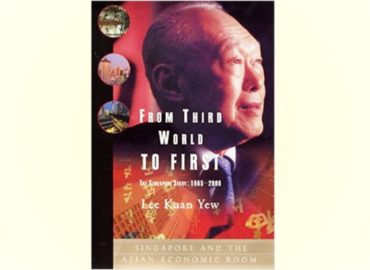PREFACE
The preface to this book started with Lee Kuan Yew (LKY) clearly stating that ” I wrote this book for a younger generation of Singaporeans who took stability, growth, prosperity for granted. I wanted them to know how difficult it was for a small country of 640sq. km with no natural resources to survive in the midst of larger, newly independent nations all pursuing nationalistic policies”
The nationalism in LKY was definitely aroused by the trauma of war in 1942 ( the second World War) and the Japanese occupation and the need to build a new economy for Singapore. LKY opined that the country (people) “cannot afford to forget that public order, personal security, economic and social progress are not the natural order of things, they depend on ceaseless effort and attention from honest and effective government that the people must elect.”
The formative years of LKY had tremendous influence on him having witnessed the prewar Singapore, the Japanese occupation, the communist upheavals and the racial problems during the two years confederation with Malaysia. This painful experience made LKY to see the need to truly emancipate his people and country. He wrote ” The Japanese occupation (1942-1945) filled me with hatred for the cruelties they inflicted on their fellow Asians, aroused my nationalism and self respect, and my resentment at being lorded over. My four years as a student in Britain after the war strengthened my determination to get rid of British colonial rule.”
LKY who returned to Singapore in 1950 was confident of this his new cause but was ignorant of the pitfalls and dangers usually associated with nationalist fighting domination and yoke of colonialism. He got involved in trade unionism and politics, formed political party and at the age of 35 became the first prime minister of an elected government of self governing Singapore. The new government which initially believed that the long term future of Singapore was to rejoin Malaya hence formed a merger with Malay to form Malaysia. Regrettably, the Malay- Chinese racial riots and intractable struggle with Malay extremists collapsed the merger and Singapore left the confederation in 1965.
LKY went further in the preface to narrate the long, hard struggle working against seemingly impossible insuperable odds to make transform Singapore from poverty stricken nation into prosperous nation in three decades.
The odds included avoiding heavy unemployment when the British withdrew its forces from Singapore, the international oil crisis of 1973, forging the various nationalities comprising Chinese, Malay, Indians into Singaporeans. But through hard work, planning and improvising, Singapore established herself into a viable nation linked by trade and investment to major industrial countries.
The Gross Domestic Product (GDP) climbed from USD 400 per capita in 1959 when LKY took over the office of prime minister to US$22,000 in 1999 when he stepped down.
He concluded the preface by saying “in material terms, we (Singapore) have left behind our Third World problems of poverty”
LKY also acknowledged the political climate in the World in the 1960s and 1970s the Cold War era and how Singapore explored the situation to build the nation. Singapore pitched its tent with the West in the bid to grow the country.
Finally, LKY in my opinion played down the importance of this book as a book that should not be seen as how-to build an economy, an army or a nation but a book on the account of the problems he and his colleagues faced and how they set about solving them. This position I believe is to avoid being immodest, it is clear that through this book, KLY has shown the way and the will on how to transform a third World nation.
LESSONS TO BE LEARNT FROM THIS PREFACE
- Leaders or those aspiring into leadership position must be driven by “anger”, “hate” or discontent to change the status quo, system in order to improve the overall wellbeing of those he or she aspires to lead. LKY was filled with hatred for the cruelties suffered by his people and vowed to change the situation.
- Only leaders that are angry with the status quo will aspire to make a change.
- Change in a nation can only be spear-headed from within.
- There are obstacles to achieving change. Leaders must believe in its capacity to surmount all obstacles.
- When there is a will, there is a way.
- Change and development of the nation and people into prosperity can only come through ceaseless effort and attention of a honest and effective government.
- If our leaders decide that we must be self reliant, it would start by ensuring that they do not have to travel abroad to get medical treatment by ensuring that good hospitals are available and functioning at home etc. They must try to replicate those good things that they see and enjoy abroad for their people.
- History of our nation, her heroes and heroines must be taught in schools so that our development process and achievements will not be taken for granted. The labour of our heroes must be taught if it would not be in vain.
Notes to be taken
i. Many words and sentences were taken from the book in order to clearly communicate what authors are saying. As much possible most of the borrowed words and sentences are in italics and quotes.
Comments and contributions are welcomed. Part I of the book Getting the Basic Right- Chapter 1- Going it Alone is next in our discussion.


